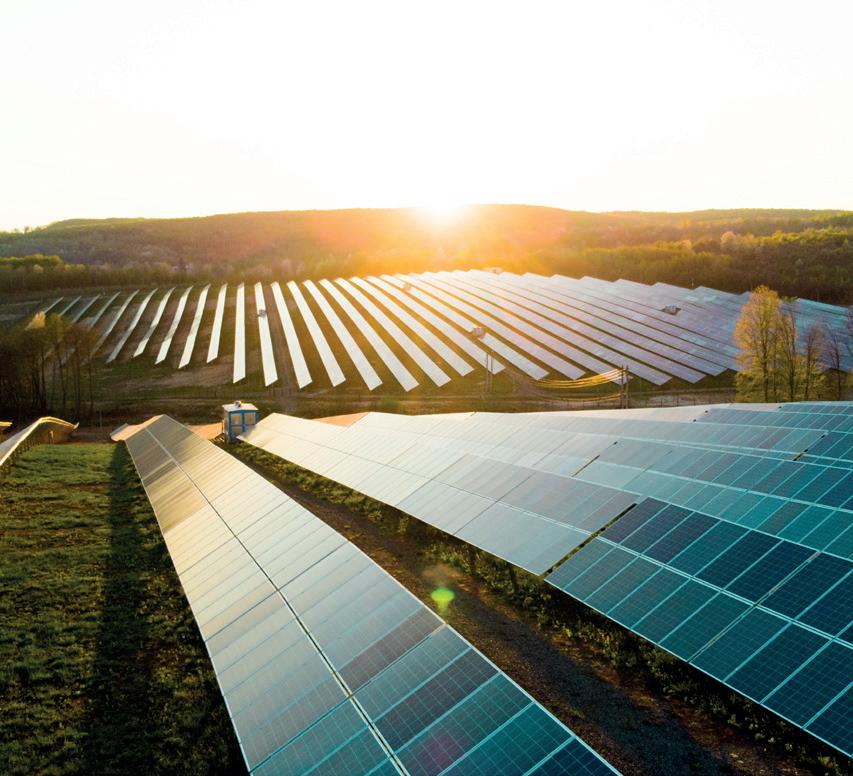
4 minute read
FIRST BUS announces investment in solar power on 20 UK sites as part of net zero-emission strategy
This investment is the latest step in First Bus’ pledge to reduce the overall emissions generated by its bus operations, as it looks to achieve the ultimate goal of net zero-emissions by 2050 or earlier. This sits alongside its goal of achieving a zero-emission bus fleet by 2035.
As one of the UK’s largest bus companies, First Bus is on a mission to make its depots self-sustaining – with the solar PV panels enabling the 20 sites to generate their own renewable power for lighting, heating, office equipment and the engineering bays. The move will not only help local bus operations by reducing costs, but it will also significantly reduce each site’s need to draw power from their local grid.
The solar PV panels already installed have been fitted to various areas of the roof on site, such as the engineering workshops, covering an approximate area of over 11,000 square metres. At peak output these will produce some 2 million kWh of energy a year – enough to power around 700 standard 3-bedroom homes.
Jon Tivey, Head of Environment for First Bus UK, said: “We are delighted to announce the rollout of our solar PV programme across the UK, which will help us to significantly reduce our carbon emissions across 20 sites.
“This is yet another milestone in our transition to a low-carbon future across every aspect of our operations. As one of the largest bus operators in the UK, it’s important that we lead the way in the industry and set an example for others to follow.”
The panels are being installed and fitted by Manchester-based solar PV suppliers CorEnergy UK, with work on many of the sites already underway. The entire project will be complete by mid-June.
CorEnergy Managing Director, Tom Griffin, said: “CorEnergy is pleased to be supporting the ambitious net zero targets committed by First Bus, having been awarded the design and installation of an exciting renewable energy project to introduce solar PV solutions to 20 sites across the UK.
UP TO £1 BN to be invested in solar by UK entrepreneur to rescue SMEs
The company will kickstart a solar electricity revolution for businesses by putting free solar panels on commercial rooftops, delivering low-cost solar electricity to its occupants from as little as 20p / unit.
British businesses are being hit hard by skyrocketing energy costs, with electricity prices for some companies jumping from 17p to 70p per kilowatt hour (kWh). With many businesses already seriously cash-strapped and locked into high-price electricity contracts, the energy crisis is putting previously viable and successful firms out of business. According to recent research by the Federation for Small Business, 24% of small firms are trapped in fixed energy contracts, with 28% (370,000 small businesses) needing to downsize, restructure or close entirely as a result.
Electron Green is stepping in to transform the way businesses can buy electricity by mixing lower cost solar electricity with higher cost supply from utility companies. £1bn would pay for the installation and maintenance of 3.4 million solar panel systems across 14,000 commercial buildings in the UK, removing the significant upfront cost and risk associated with commercial solar electricity to date. Electron Green anticipates up to £1bn of funding will be allotted to new projects in under year, such is businesses’ pentup demand for cheaper, cleaner electricity.
Electron Green, the commercial solar electricity firm, today announces up to £1 billion of funding for solar to end the business energy crisis.
Daniel Green, CEO and Co-Founder of Electron Green comments, “Businesses cannot continue to be at the whim of Big Energy and market volatility. It’s time to shake up the energy buying status quo and embrace low-cost on-site renewables.
“£1bn would enable thousands of businesses to take back control of their electricity energy spend for the first time. Adding low-cost green solar electricity to businesses’ energy mix will significantly reduce bills by enabling them to use more cheap solar electricity in lieu of expensive utility electricity, providing certainty in an increasingly uncertain world. This is essential to not only save the SME backbone of our economy from breaking but to also hit net zero goals.”
Calculations based on UK figures for solar energy, show that just 1% of commercial property roofs in the UK have solar panels and landlords have been identified as a significant blocker of investment to date. While it’s hoped this will change as landlords adapt to meet increasingly stringent sustainability-led EPC rules by 2027, there’s a clear need for more to be done now to support businesses and reach net zero goals.
First Bus has invested £2.5m in solar power with the installation of over 6,000 solar photovoltaic (PV) panels across 20 depot sites as part of its net zero emissions strategy.
“In a time where all businesses are striving for carbon neutrality, this successful solar PV project will play a significant role in supporting First Bus to reduce greenhouse gas emissions and meet ongoing net zero objectives.”
Green continues, “Landlords have been standing in the way of cheap electricity for tenants, but it’s time for them to move aside. Sustainability rules will hurt business models sooner than many realise. Putting solar on rooftops now is a critical step as they adapt portfolios in the race to 2027.”

With banks and large institutions very keen to see low carbon investment opportunities realised, up to £1bn of funding would be backed by private investment from Electron Green and some of the largest banks and partners in the world.
Phil Adam, Partner, Head of Infrastructure Advisory, Debt & Capital Advisory, Deloitte LLP comments, “We are delighted to be supporting Electron Green with their scaled focus on the commercial solar market assisting their UK corporates reduce their energy costs and meet their net -zero targets.”










